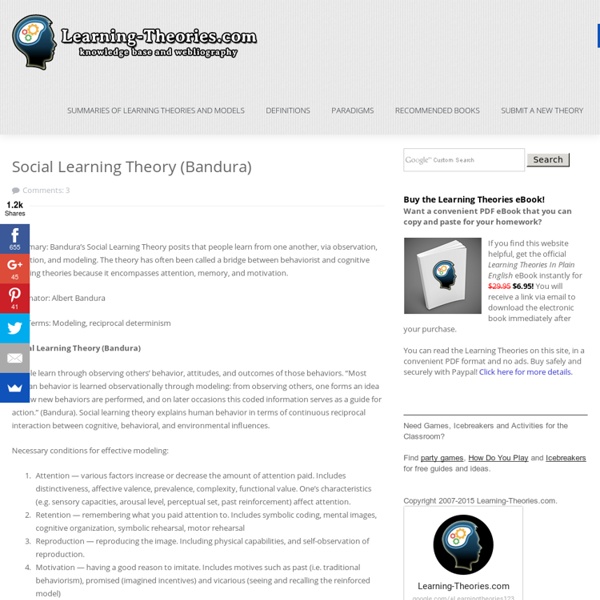Social Learning Theory (Bandura
Summary: Bandura’s Social Learning Theory posits that people learn from one another, via observation, imitation, and modeling. The theory has often been called a bridge between behaviorist and cognitive learning theories because it encompasses attention, memory, and motivation. Originator: Albert Bandura Key Terms: Modeling, reciprocal determinism Social Learning Theory (Bandura) People learn through observing others’ behavior, attitudes, and outcomes of those behaviors. Necessary conditions for effective modeling: Attention — various factors increase or decrease the amount of attention paid. Bandura believed in “reciprocal determinism”, that is, the world and a person’s behavior cause each other, while behaviorism essentially states that one’s environment causes one’s behavior, Bandura, who was studying adolescent aggression, found this too simplistic, and so in addition he suggested that behavior causes environment as well. For more information, see:
Object Centered Sociality
Wow. I just read this mind-blowing post by Jyri Engestrom in response to my post about leaving Linked In. It's very well thought out and opens a whole new perspective to social networking for me that I completely, 100% sign on to: Basically I'm defending an alternative approach to social networks here, which I call 'object centered sociality' following the sociologist Carin Knorr Cetina. I'll try to articulate the conceptual difference between the two theories and briefly demonstrate that object-centered sociality helps us to understand better why some social networking services succeed while others don't.Russell's disappointment in LinkedIn implies that the term 'social networking' makes little sense if we leave out the objects that mediate the ties between people. Think about the object as the reason why people affiliate with each specific other and not just anyone. This is one of those days when I love blogging. Very cool. -Russ
Leaky Grammar | Second Language Acquisition, Language Learning
ac.els-cdn.com/S2210656112000050/1-s2.0-S2210656112000050-main.pdf?_tid=ccdd2ab8-236b-11e2-93ab-00000aab0f6c&acdnat=1351695848_aca120be83db751835c5d2c20ce43190
ac.els-cdn.com/S2210656112000049/1-s2.0-S2210656112000049-main.pdf?_tid=c898306a-236b-11e2-93ab-00000aab0f6c&acdnat=1351695840_01c48cf62c3b066132c18dba0bf11436
the social/situational orientation to learning @ the informal education homepage
The social/situational orientation to learning. It is not so much that learners acquire structures or models to understand the world, but they participate in frameworks that that have structure. Learning involves participation in a community of practice. Social learning theory ‘posits that people learn from observing other people. By definition, such observations take place in a social setting’ (Merriam and Caffarella 1991: 134). Within psychology, initially it was behaviourists who looked to how people learned through observation. Learning would be exceedingly laborious, not to mention hazardous, if people ha d to rely solely on the effects of their own actions to inform them what to do. Attending to a behaviour; remembering it as a possible model or paradigm; and playing out how it may work for them in different situations (rehearsal) are key aspects of observational learning. Symbols retained from a modelling experience act as a template with which one’s actions are compared.
The Instructional Use of Learning Objects -- Online Version
This is the online version of The Instructional Use of Learning Objects, a new book that tries to go beyond the technological hype and connect learning objects to instruction and learning. You can read the full text of the book here for free. The chapters presented here are © their respective authors and are licensed under the Open Publication License, meaning that you are free to copy and redistribute them in any electronic or non-commercial print form. In addition to reading the book, at this website you can participate in discussions of the book's chapters with the authors and others, submit any corrections should you find errors in a chapter, and discuss other issues related to learning objects, instruction, and learning. The book is divided into five major sections. 1.0. 2.0. 3.0. 4.0. 5.0. This site is maintained by David Wiley. Copyright © 2000 by the authors listed above.
Related:
Related:



